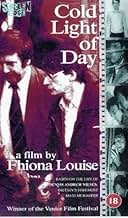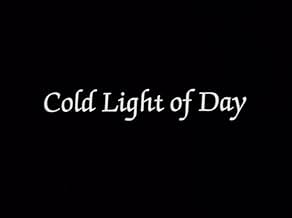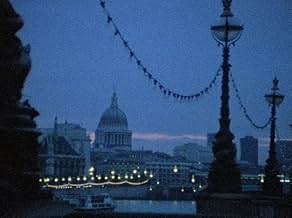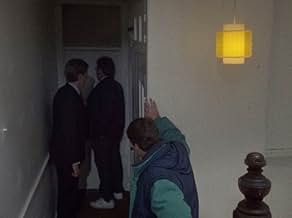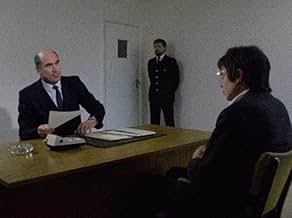Sigue la historia ficticia basada en las acciones del asesino en serie Dennis Nilsen.Sigue la historia ficticia basada en las acciones del asesino en serie Dennis Nilsen.Sigue la historia ficticia basada en las acciones del asesino en serie Dennis Nilsen.
- Dirección
- Guión
- Reparto principal
- Premios
- 1 premio en total
Eugene Cheese
- Grandfather
- (as Paul Jay)
Louis Haslar
- Rent Boy
- (as Louis Hasler)
Reseñas destacadas
"Cold Light of Day" follows a middle-aged man in London who begins preying on street punks and homeless men, bringing them back to his apartment where he inevitably kills them (before doing other horrible things).
Based on the crimes of Dennis Nilsen, this little-seen no-budget effort is a lot better than you might expect it to be. On one hand, it is very "student film"-ish, which is not necessarily surprising given that its writer-director was only 21 years old when it was released. That being said, this is quite an impressive debut, especially for someone of that age.
While not exactly an enjoyable viewing experience, there is something oddly compelling about the film; the narrative is pretty standard for this type of fare (killer recounts crimes in flashback, rinse and repeat), but a dour, gritty sensibility permeates every frame here, and the effect is powerful. An ominous, repetitive musical score adds to the mood (mixed with a never-ending heartbeat effect) amicably, and the performances are quite solid, despite what some of the other reviewers have written. The special effects are also respectable. The only legitimate problem I had with the the film is that it does not really have a fitting conclusion, which does leave a bit to be desired.
That said, this is a fairly potent effort that paints the life of a killer in shades of pallid grey. "Cold Light of Day", though not revolutionary, is a dour and straightforward look into a world of tormented people, some predators, and some prey. Despite its student film-ish shortcomings, it is a fairly well made crime-horror hybrid. 6/10.
Based on the crimes of Dennis Nilsen, this little-seen no-budget effort is a lot better than you might expect it to be. On one hand, it is very "student film"-ish, which is not necessarily surprising given that its writer-director was only 21 years old when it was released. That being said, this is quite an impressive debut, especially for someone of that age.
While not exactly an enjoyable viewing experience, there is something oddly compelling about the film; the narrative is pretty standard for this type of fare (killer recounts crimes in flashback, rinse and repeat), but a dour, gritty sensibility permeates every frame here, and the effect is powerful. An ominous, repetitive musical score adds to the mood (mixed with a never-ending heartbeat effect) amicably, and the performances are quite solid, despite what some of the other reviewers have written. The special effects are also respectable. The only legitimate problem I had with the the film is that it does not really have a fitting conclusion, which does leave a bit to be desired.
That said, this is a fairly potent effort that paints the life of a killer in shades of pallid grey. "Cold Light of Day", though not revolutionary, is a dour and straightforward look into a world of tormented people, some predators, and some prey. Despite its student film-ish shortcomings, it is a fairly well made crime-horror hybrid. 6/10.
One has to admire the balls it took to make this movie. For a start, the atmosphere is cloying and intense, and if you've taken the time to track this movie down then chances are you probably know a little bit about it. Based on the crimes of British serial Killer Dennis Nielson, cold light of day is a slice of docu-drama little like anything you've ever seen before. i saw this on video in its 75 minute entirety, and it is a difficult movie to sit through. It makes you feel so uncomfortable, and tries, in its own way to present its characters with some compassion, but they are all so cold and pathetic that you squirm in your seat and wait for it to end. It took me a long time to track this little gem down, and it has had a couple of releases in the UK throughout the 1990's, but its a hard film to watch. Certainly a must for serial killer movie buffs or anyone interested in lensing their first movie, cold light of day is awkward and, in several places, downright unpleasant. Henry Portrait of a serial killer was gruesome, Cold Light of Day is a shiver than runs down your spine in the dead of night.
If you are reading this you will have come here with a purpose. The sadistic trail of murderous narcissism left behind by Dennis Nilsen from 1978 until being caught in 1983 will be familiar.
This low budget retelling, in the style of a reject Channel 4 documentary, disappoints on several levels. The production could have been much more effective as a Film Noir. Narrative should drive the action which takes place in the shadows. Much more should have been made of conceptual imagery. The long, wandering take of Nilsen's room that concludes the film hints at what is possible.
One of the first ideas drummed into fledgling film editors is that sound is king. People will forgive the occasional wobble or slip in focus, even a dreadful edit, but will only endure a few moments of poor sound. From the opening whirl and deafening whoosh of whistling wind underpinned with rhythmic thumps, through the oh so too long tolling funeral bell complete with Darth Vader breathing, to the invasive wild-takes in street scenes, the soundtrack is jarring.
The action of the film, concerning the enticement of the victims, their strangulation and drowning, followed by their dismemberment and disposal, is interspersed with sections of the police interview after arrest. My reading of the notes taken at the time, this was before PACE and the routine tape recording of interviews, along with the subsequent evidence at trial, portrays a civil interrogation of a compliant, emotionless Nilsen, calmly admitting to his crimes. In Fhiona Louise's version here we have the lead detective, Chief Inspector Simmons (Geoffrey Greenhill), in real life DCI Peter Jay, railing and shouting with his suspect, trying to obtain admissions of perversion and worse.
The Nilsen character is played by Bob Flag, bearing an uncanny resemblance to the murderer. For the film he is renamed Jorden March, possibly a nod to Whitemoor prison where, for a while, he was held.
If you know nothing about this case then pass this one by. If you are knowledgeable then you will find nothing new here except interpretation. If you are looking for a low budget, amateurish, short to deconstruct then you have hit the jackpot.
This low budget retelling, in the style of a reject Channel 4 documentary, disappoints on several levels. The production could have been much more effective as a Film Noir. Narrative should drive the action which takes place in the shadows. Much more should have been made of conceptual imagery. The long, wandering take of Nilsen's room that concludes the film hints at what is possible.
One of the first ideas drummed into fledgling film editors is that sound is king. People will forgive the occasional wobble or slip in focus, even a dreadful edit, but will only endure a few moments of poor sound. From the opening whirl and deafening whoosh of whistling wind underpinned with rhythmic thumps, through the oh so too long tolling funeral bell complete with Darth Vader breathing, to the invasive wild-takes in street scenes, the soundtrack is jarring.
The action of the film, concerning the enticement of the victims, their strangulation and drowning, followed by their dismemberment and disposal, is interspersed with sections of the police interview after arrest. My reading of the notes taken at the time, this was before PACE and the routine tape recording of interviews, along with the subsequent evidence at trial, portrays a civil interrogation of a compliant, emotionless Nilsen, calmly admitting to his crimes. In Fhiona Louise's version here we have the lead detective, Chief Inspector Simmons (Geoffrey Greenhill), in real life DCI Peter Jay, railing and shouting with his suspect, trying to obtain admissions of perversion and worse.
The Nilsen character is played by Bob Flag, bearing an uncanny resemblance to the murderer. For the film he is renamed Jorden March, possibly a nod to Whitemoor prison where, for a while, he was held.
If you know nothing about this case then pass this one by. If you are knowledgeable then you will find nothing new here except interpretation. If you are looking for a low budget, amateurish, short to deconstruct then you have hit the jackpot.
Between 1978 and 1983, Dennis Nilsen - an outwardly unremarkable former soldier and police officer turned civil servant - killed at least fifteen men and boys (most of them students or homeless) in gruesome circumstances, allegedly retaining the corpses for sex acts before disposing of the butchered remains by hiding them in cupboards, under the floorboards, or simply by flushing them down the toilet. This grimy, clammy, little-seen independent film is a lightly fictionalised account of Nilsen's hideous deeds, with a standout performance from Bob Flag as the milquetoast murderer, here renamed Jorden March.
Fhiona Louise's film, clearly made on a shoestring budget, steers clear of exploitation tactics, choosing instead to cast its characters adrift in a singularly bleak, uncaring and desolate world of tatty pubs, squalid bed-sits, greasy cafés and grubby bathrooms. The police interrogation of March is inter-cut with flashbacks that reveal not just his crimes (a living room disembowelment and the discovery of what's blocking the drains will send a shiver down the spines of even the hardiest souls) but also provide a window of understanding into what has tipped the apparently kindly loner over the edge. Louise's direction is unobtrusive and detached, allowing the lengthy exchanges between the characters to play out in several lengthy takes, but it's this cold, flat, cinema-verité style that affords the proceedings much of their chilling power, conveying the sense that such horrors really could be unfolding in the street, or even the house, just around the corner.
It's an easy film to admire - it won several awards - but it's not an easy film to watch, let alone enjoy. As a fitting footnote, a caption card dedicates the preceding horrors to "those too sensitive for this world" - which, in his own perverse and twisted way, Nilsen surely was.
Fhiona Louise's film, clearly made on a shoestring budget, steers clear of exploitation tactics, choosing instead to cast its characters adrift in a singularly bleak, uncaring and desolate world of tatty pubs, squalid bed-sits, greasy cafés and grubby bathrooms. The police interrogation of March is inter-cut with flashbacks that reveal not just his crimes (a living room disembowelment and the discovery of what's blocking the drains will send a shiver down the spines of even the hardiest souls) but also provide a window of understanding into what has tipped the apparently kindly loner over the edge. Louise's direction is unobtrusive and detached, allowing the lengthy exchanges between the characters to play out in several lengthy takes, but it's this cold, flat, cinema-verité style that affords the proceedings much of their chilling power, conveying the sense that such horrors really could be unfolding in the street, or even the house, just around the corner.
It's an easy film to admire - it won several awards - but it's not an easy film to watch, let alone enjoy. As a fitting footnote, a caption card dedicates the preceding horrors to "those too sensitive for this world" - which, in his own perverse and twisted way, Nilsen surely was.
Produced by, and with strong ties (no pun intended!) to "Britain's worst director" (and convicted fraudster) Richard Driscoll, this film, which I first saw near its original release in the 90s, has curiously been resurrected from cinema's dustbin for a recent Blu-ray.
Booed off the screen (literally!) upon its limited release in 1990, this fictionalised 'true story' of the Dennis Nilsen serial killer case from north London in the early 80s is told with zero subtlety or respect. Massively re-adjusting events (for titillation, I'm guessing. For example, 'Nilsen' visits a female prostitute - something which never happened and only seems an excuse to show crude T&A) and the barely-a-feature film includes an insulting, confusing end caption.
It's hard to say what director Fhiona Louise (sometimes styled as Fhiona-Louise -- which is it?!) intended, but the stodgy dialogue and delivery has Driscoll written all over (see, or really don't, any of his other epics like The Comic or Kannibal) and the filmmaking looks like something unsure film students would do, complete with awkward camera half-moves and bit-parters delivering unintentional comedy (a senile neighbour shuffles back to his room like it's a comedy-act and we get lines like "oh s**t!" about a blocked toilet uttered with zero self-awareness).
The whole film only succeeds in capturing the grim reality of Bedsitland at the time (purely by coincidence as many parts of the now gentrified North London were still like that at the time), becoming a period piece in a way.
Ultimately though, it has nothing to say, no care for the victims and generally seems concocted as a quick cash-grab.
Ironically (or why it was rereleased when nobody was asking for it?), a big budget ITV dramatisation of the Nilsen case was also shown in 2020, the same year as Arrow's Blu-ray Special Edition. Unlike Cold Light of Day, it decided to avoid all of the gruesome aspects and position itself as a generic detective drama with a smattering of stock-footage for confusing context.
Those wishing to find out more about the real case are better off seeking out the thorough book Killing for Company.
There's also a BBC Two short film from the late 80s called (viewable on YouTube) called The Monochrome Man which says far more - with much greater assuredness and panache - than this amateurish film ever could.
Booed off the screen (literally!) upon its limited release in 1990, this fictionalised 'true story' of the Dennis Nilsen serial killer case from north London in the early 80s is told with zero subtlety or respect. Massively re-adjusting events (for titillation, I'm guessing. For example, 'Nilsen' visits a female prostitute - something which never happened and only seems an excuse to show crude T&A) and the barely-a-feature film includes an insulting, confusing end caption.
It's hard to say what director Fhiona Louise (sometimes styled as Fhiona-Louise -- which is it?!) intended, but the stodgy dialogue and delivery has Driscoll written all over (see, or really don't, any of his other epics like The Comic or Kannibal) and the filmmaking looks like something unsure film students would do, complete with awkward camera half-moves and bit-parters delivering unintentional comedy (a senile neighbour shuffles back to his room like it's a comedy-act and we get lines like "oh s**t!" about a blocked toilet uttered with zero self-awareness).
The whole film only succeeds in capturing the grim reality of Bedsitland at the time (purely by coincidence as many parts of the now gentrified North London were still like that at the time), becoming a period piece in a way.
Ultimately though, it has nothing to say, no care for the victims and generally seems concocted as a quick cash-grab.
Ironically (or why it was rereleased when nobody was asking for it?), a big budget ITV dramatisation of the Nilsen case was also shown in 2020, the same year as Arrow's Blu-ray Special Edition. Unlike Cold Light of Day, it decided to avoid all of the gruesome aspects and position itself as a generic detective drama with a smattering of stock-footage for confusing context.
Those wishing to find out more about the real case are better off seeking out the thorough book Killing for Company.
There's also a BBC Two short film from the late 80s called (viewable on YouTube) called The Monochrome Man which says far more - with much greater assuredness and panache - than this amateurish film ever could.
¿Sabías que...?
- CuriosidadesClaire King has a small role in this film as a Prostitute who is better known as Kim Tate in popular UK Drama Emmerdale.
- PifiasIn the end credits, the word 'prosthetics' is misspelled 'prosphetics'.
- Créditos adicionalesBefore the end credits, a caption appears that reads 'For those too sensitive for this world - Fhiona'.
- ConexionesReferenced in Film Junk Podcast: Episode 905: Talk to Me + Extra Terrestrial Visitors (2023)
Selecciones populares
Inicia sesión para calificar y añadir a tu lista para recibir recomendaciones personalizadas
- How long is Cold Light of Day?Con tecnología de Alexa
Detalles
- Duración1 hora 20 minutos
- Color
- Relación de aspecto
- 1.37 : 1
Contribuir a esta página
Sugerir un cambio o añadir el contenido que falta

Principal laguna de datos
What is the French language plot outline for Cold Light of Day (1990)?
Responde
